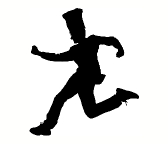 |
 |
||||

Baba / [bah-buh]:
French or Italian small sweet cake made from enriched yeast dough, often flavored with candied fruits and soaked with a rum or Kirschwasser syrup after baking.
Bain-marie / [beyn-muh-ree]:
The French term for a water bath used to cook foods gently by surrounding the cooking vessel with simmering water. Also, a set of cylindrical nesting pots used to hold foods in a water bath or with a single, long handle used as a double boiler. Also, steam table inserts.
Balsamic Vinegar / [bawl-sam-ik-vin-i-ger]:
An aged reduction of white sweet grapes that are boiled to syrup. The grapes are cooked very slowly in copper cauldrons over an open flame until the water content is reduced by over 50%. The resulting "grape must" is placed into wooden barrels where older balsamic vinegar is added to assist in the acetification. Each year the vinegar is transferred to different wood barrels so that the vinegar can obtain some of the flavors of the different woods. Balsamic vinegar can only be produced in the regions of Modena and Reggio in Italy.
Baking Soda:
Is the alkaline element bicarbonate of soda, is used solely as a chemical leavener in baking. Because it is not premixed with an acid, as is baking powder, it is used alone in baked goods where other ingredients, which also contain acid, are present (yogurt, buttermilk, lemon juice, or sour cream). When the baking soda and acid are combined, they neutralize each other, causing carbon dioxide gas bubbles to form. The bubbles make the dough or batter grow bigger, or rise. Baking soda is more volatile than baking powder because it begins to act the minute you moisten it with the wet ingredients. You must put whatever you are baking right in the oven once the baking soda has been activated.
Baklava / (BAHK-lah-vah): A middle eastern (especially Greece and Turkey) pastry that is made with buttered layers of phyllo dough and layered with finely chopped nuts. After baking, a syrup of honey, rose water and lemon juice (sometimes spiced with cinnamon, cardamom, cloves, etc) is poured over the pastry and allowed to soak in.
Basil / [baz-uhl]:
Native to India, it has long been a mainstay in Italian cooking. Its leaves have a spicy smell and flavor that work well in everything from seafood cocktails and soups to stews and other meat dishes.
Baste / [beyst]:
To moisten food during cooking with pan dripping sauce, or other liquid. Basting prevents food from drying out.
Batter / [bat-er]:
A mixture of flour and liquid, sometimes with the inclusion of other ingredients. Batters vary in thickness but are generally semi-liquid and thinner than doughs. Used in such preparations as cakes, quick breads, pancakes, and crêpes.
Batonnet / [ba-tawn-NAY]:
1. Various small, stick (baton) shaped foods — such as vegetables or pastries — that may or may not have a filling.
2. Foods cut into matchstick shapes of 1/4 in. X 1/4 in. X 2 in (6mmX6mmX5cm)
Béchamel / [bey-shuh-mel]:
A white sauce made of milk thickened with a light roux and flavored with a white mirepoix (click for definition). One of the grand sauces.
Béarnaise / [ber-neyz]:
This is the most notable of all the hollandaise sauce variations. It is made with a wine and vinegar reduction, egg yolks, butter and flavored with tarragon or other herbs. This sauce is often served with meats and fish.
Beurre Blanc / [bur blahngk]:
Literally, “white butter”. A classic emulsified sauce made with a reduction of white wine and shallots thickened with whole butter and possibly finished with fresh herbs or other seasonings.
Bibb Lettuce:
A variety of butterhead lettuce with soft, pliable green leaves that have a buttery texture and flavor; also known as limestone lettuce.
Biscotti / [bee-skawt-taw]:
Dry Italian cookies flavored with almonds, chocolate, or anise seed, used for dunking in coffee and sweet dessert wine.
Bisque / [bisk]:
A thick, rich creamy soup containing fish or game or pureed vegetables. A rich shellfish soup made with the shells of the animal. The soup is enriched with cream and Cognac and garnished with pieces of the shellfish meat. This name is also used to describe vegetable soups prepared in the same manner as shellfish bisques.
Bistro / (bees-troh):
In France, a bistro used to be a bar that also sold wine. Today a bistro is a small neighborhood restaurant with a comforting, predictable menu and reliable daily specials.
Blanch:
To cook an item less than a minute in boiling water before finishing or storing it. Blanching preserves the color and helps remove the peels of some fruits and vegetables.
Blintz / [blints]:
This is the Yiddish word, derived from blini for a small pan-fried battercake that is rolled with meat, potato, cheese, or fruit filling.
Braise / [breyz]:
A cooking method in which the main item, usually meat, is seared in fat, then simmered at a low temperature in a small amount of stock or another liquid (usually halfway up the meat item) in a covered vessel for a long time. The cooking liquid is then reduced and used as the base of a sauce.
Brunoise / [broon-wah]:
A very fine dice usually applied to vegetables.
Brulé / [broo-ley]:
Finishing method applied to dishes such as cream custards finished with caramelized sugar glaze. Can be done with a torch or under the broiler.
Advertisement

![]()